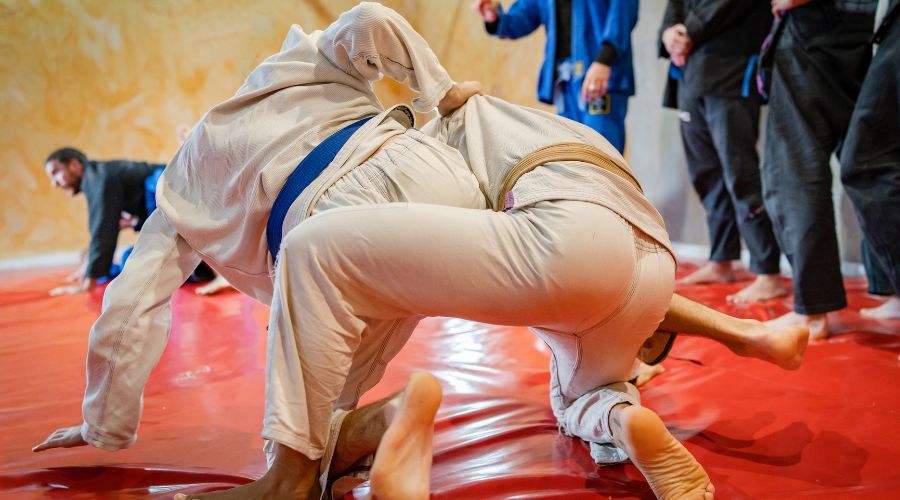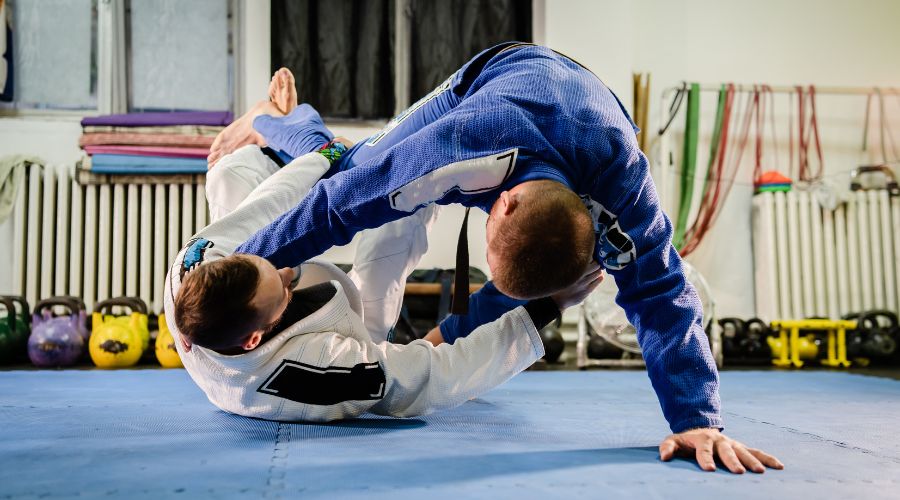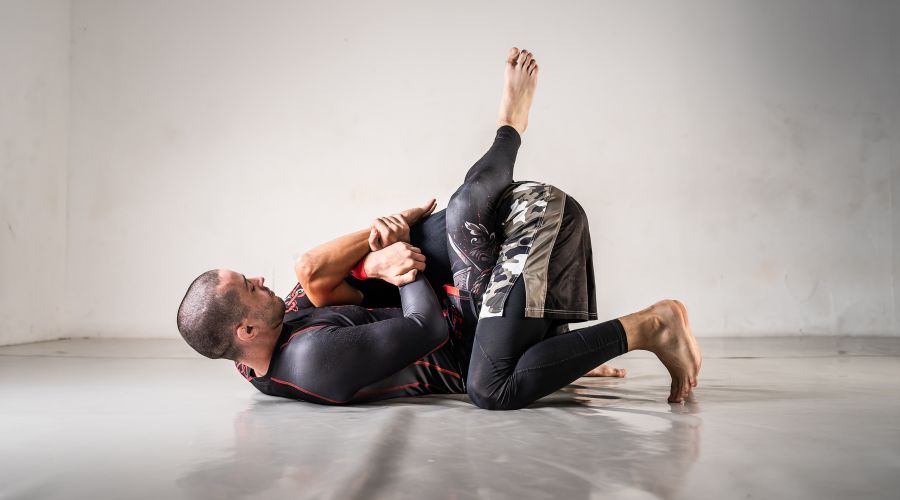Practicing skills designed to hurt another person is a tricky task in all martial arts. You cannot be good at it without practice, but you also need to be safe to practice for long enough. Sparring aims to replicate competitions or real combat more safely, and it’s a crucial element of many martial arts, including BJJ. But in jiu-jitsu, sparring has another name.
Sparring in Brazilian jiu-jitsu is called rolling. Rolling is an essential part of BJJ practice and lets you test your skills and knowledge against training partners in a more realistic scenario. The intensity of the sparring can vary from very light to 100%, but the key is that it’s not prearranged like drilling.
Rolling can be daunting even when you are experienced, but it Is something everyone loves to do and the only way to truly know how good you really are on an everyday basis. Regardless if you are fresh in the gym anticipating your first sparring session or someone with hundreds of rounds under their belt, there is also something more to learn.
What Is Rolling in BJJ
Rolling is the word used for sparring in Brazilian Jiu-Jitsu. Because of the nature of the sport and the fact that 99% of the time is spent on the ground, rolling is indeed a more appropriate specific word to describe sparring in BJJ.
Rolling is a crucial element of the sport and the expression of the philosophy of effectiveness before everything else, implemented from the very first days of BJJ.
Unlike other traditional martial arts, where choreographed and pre-arranged forms of drilling take up the bulk of training time, BJJ focuses entirely on live drilling and sparring. This approach is inherited from judo, where it’s called randori and is also the main training method.
Sparring, randori, and rolling are basically the same thing: a free practice where you test your skills in the martial art against training partners in conditions similar to a contest.
This means your moves will be resisted, defended, and countered, and you will try to out-grapple your partner.
Sparring partners try to take each other down, advance position, and finish a submission according to the agreed rules and etiquette.
But a submission is not necessarily the goal every time. Everyone can have a different focus each session or even each round, like achieving or holding a specific position, not letting the partner do something specific, or trying out new moves.
Although rolling simulates competition, the intensity is not always 100%. Depending on the level of the practitioners and the individual goals for the session, rolling can be very light. But the conditions of not knowing what the partner will do are what make rolling what it is, not the intensity.
Rolling is the most fundamental element of training because it is the only way to test your skills for real and be truly prepared for competition or a real-life situation.
The big factor differentiating effective martial arts like BJJ from ineffective ones like Aikido, for example, is precisely free sparring.
Unless you are accustomed to overcoming a fully resisting opponent who is also trying to out-grapple you, I can guarantee you will not be able to pull off a single technique the first time it happens to you for real.
It’s exactly this live sparring approach to training and testing against different styles that have made jiu-jitsu so effective as a grappling style, for self-defense, and in MMA.
When Should You Start Rolling?

There is no specific time you should start rolling. In most places, the coach will wait at least a couple of months before he lets you participate in free rolling.
BJJ is an extremely information-dense martial art, and it takes some time before you can start piecing all the information together and understanding how everything works in unison.
But there are places where you will spar in the second class of training. Is this a good idea? It depends a lot on previous experience and fitness level.
When I first started grappling, I already had 10 years of striking experience, so I was used to sparring and the mental aspects of it, so I started rolling from the first day. Of course, I was demolished, but this didn’t dishearten me; it just showed me how much I have to learn.
But for someone with no martial arts or athletic background, this experience is very likely to be overwhelming and just put them away from the sport. This is why most coaches wait a few months before they allow new students to spar.
During this initial period, you will learn the concepts and pillars of BJJ and drill the new techniques. By drilling, you get accustomed to the feeling of the positions, of being on bottom and under pressure, the feeling of having your neck squeezed, your arm extended, and all the “sweet” stuff you will be constantly put through on the mats.
Beginners Guide To BJJ Rolling

There are so many tips I can give you on how to survive and get the most out of your early sparring sessions. Perhaps the most important thing is to try your best to be calm.
I know it’s easier said than done, but only after you learn how to remain somewhat calm will you be able to apply your skills and not act based on instinct, which in the beginning is usually the polar opposite of what is right.
Focus on Defense
Before you become a proficient submission artist, you will first need to learn how to defend. First, you must know how to survive bad situations, escape, and reverse bad positions before you can win dominant ones and start locking in submissions.
Especially as a white belt, a huge portion of rolling consists of trying to escape mount or side control and not get strangled at the same time.
Rolling as a fresh white belt, you should focus on defending the most common submissions and the most important positional rules, like:
- Keeping your elbows tucked to the body,
- Using your hips effectively
- Keeping a strong base and balance
- Avoid being stuck on bottom.
Tap Early And Often
BJJ can be a very safe martial art to practice if you are not a knucklehead about it (and your training partners are not). Most submissions are very safe if you tap to them in time, and there is no reason to suffer a sprain or other injury because you refuse to tap in sparring.
In competition, you should also tap before it’s too late, but at least there is a stake there, so it’s understandable to try and endure.
But during rolling, it’s outright dumb to try and tough out a submission, especially a joint lock. In time, you will learn a bit better when a choke is really tight and when it’s just uncomfortable, but with joint locks, the repercussions are a bit severe, so it’s better to tap early than to be sorry.
Ask Questions
Don’t be afraid to ask your teammates and instructors for more advice. Especially when you are rolling with someone more experienced, he can help a lot with giving feedback on what you are doing wrong and what you are doing right.
I am certain your instructor encourages seeking knowledge, so it’s very unlikely that you’ll be denied help from an instructor or training partner. Use this fact and ask questions.
Be Courteous
Respect is something inherent in all martial arts and combat sports, but BJJ has a more traditional element to it than western wrestling, for example, and being courteous and respectful is even more prevalent there.
Follow the etiquette in the gym, always show respect to your training partners and, most of all, to the instructor, and you will surely receive the same.
If you are not sure what the proper way to do something is or if something is allowed or not it’s better to ask than to try it and then have to explain you didn’t know you weren’t supposed to. This also applies to techniques not allowed in BJJ competition in general, or at least not welcomed in rolling.
Your behavior is also a factor heavily considered for belt promotion, so being polite during rolling is one of the requirements to progress through the ranks.
How To Get Better At Rolling

The advice from the previous paragraphs is completely valid for all levels but they are the most important things for a beginner. For those with more experience, the list does not change, it just expands.
Roll With Specific Purpose
Once you are more experienced in BJJ, something to boost your progress is rolling with a specific purpose. This can be many things, depending on the person you are rolling with and your goals at the moment.
Rolling with a specific goal in mind is done to perfect new techniques, iron out specific weaknesses, or prepare for a specific scenario, to name a few goals.
For example, you may feel your bottom-side control game stinks, and you want to be better. Then you can intentionally let partners get to side control, so you can try to escape.
Or you have a new setup for a Darce choke and want to test it out against different people. If you are facing much more experienced partners, you can roll with the goal of not getting submitted more than twice or something in that vein.
Having a specific goal is not always necessary, but it is a great way to progress in specific areas, plus it spices things up. Having a specific goal can be very valuable if you spar against people of a much lower skill level because you will present tough challenges to yourself.
Lose the Ego
This is one piece of advice everyone likes to give. Rolling is not a competition and is not about winning or losing. It’s about learning and improving, so don’t place too much importance on finishing a submission in sparring or stressing about being tapped out. Your ego will be crushed either way, so it’s better to leave it outside of the gym in advance.
Sparring is exactly the place and time to try new techniques, and worrying too much if they may cause you to lose a position or fall into a submission will prevent you from trying and mastering new things.
That said, competitive hard sparring has its place. After all, we are into combat sports, and we all love some real pressure from time to time.
When you are rolling with people at your skill level, amplifying the intensity and trying to win is completely normal, in my opinion. But most of the time, the focus should be on progressing and learning from every situation.
Summary
There is so much more that can be said about rolling. It is what makes BJJ as effective and adaptive as it is, and you should place the utmost importance on it.
Sparring is fun, scary, intense, tiring, and the most valuable part of your training. Having the right approach and mindset towards it will make life on the mats easier and progress more seamless.
Hopefully, the article has helped you prepare for your first rolling session, or advanced your knowledge a bit if you are already sparring.
